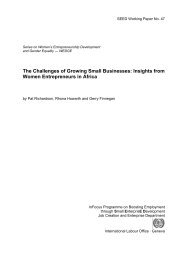manual: women workers' rights and gender equality - International ...
manual: women workers' rights and gender equality - International ...
manual: women workers' rights and gender equality - International ...
Create successful ePaper yourself
Turn your PDF publications into a flip-book with our unique Google optimized e-Paper software.
• Interviewing<br />
• Negotiating<br />
• Taking part in a meeting.<br />
Compared with other training methods, role plays can offer particular benefits. Role plays:<br />
• Offer a very active training method <strong>and</strong> can be an eye-opener, especially for those, who play<br />
• Develop the skills of workshop participants (e.g. preparing <strong>and</strong> presenting an argument)<br />
• Help build the confidence of participants<br />
• Can be useful as situations can be acted out to identify how (not) to deal with particular issues<br />
• Can provide insights into patterns of behaviour, <strong>and</strong> how people relate to each other<br />
To increase the likelihood of role plays being used successfully, you should give consideration to<br />
the following points:<br />
• Workshop participants should know what the aims of the role play are<br />
• You can pre select players or ask for volunteers. People should not be pressurized to play<br />
• They need to underst<strong>and</strong> clearly what they are being asked to do, <strong>and</strong> their own particular role<br />
• Individual roles should be kept simple <strong>and</strong> brief, emphasizing the main issues under<br />
consideration. Players can improvise as they see fit<br />
• The role play should build upon the experience of participants, i.e. it is usually easier for<br />
<strong>women</strong> to play <strong>women</strong> <strong>and</strong> for men to take the role of men. However, there will be times when<br />
participants are deliberately given a role, or placed in a situation, which is new to them. It can<br />
be very useful for both sexes to play the role of the opposite sex<br />
• Adequate time must be allowed for participants to prepare their roles<br />
• Usually some participants will be given the role of observers, to witness <strong>and</strong> report back on the<br />
role play as a whole<br />
• Stop the role play when the actors start repeating themselves <strong>and</strong> no new points are coming up<br />
Case studies or stories<br />
Case studies involve a story, a detailed description of an event, a situation, or a problem <strong>and</strong> ways<br />
to deal with it. Part of their value lies in the fact that the stories look at situations of ‘others’ without<br />
participants feeling they have to take a personal stance. This means that sensitive issues can be<br />
introduced into a training while nobody feels they have a position to immediately defend or attack.<br />
It should be kept in mind that the case studies must be relevant to the subject matter <strong>and</strong> aims of<br />
the course in which they are being used. Case studies can be based upon real events or life<br />
situations. Do not make long <strong>and</strong> detailed case studies. If you wish the workshop participants to<br />
look at an issue in some depth, then use the problems <strong>and</strong> experience of the participants<br />
themselves.<br />
Evaluation<br />
Feedback should be obtained from participants on the relevance <strong>and</strong> usefulness of each<br />
awareness raising session or training workshop. This is usually done through an evaluation with a<br />
view to:<br />
• identify whether the workshop is meeting the aims<br />
• consider the suitability of the workshop content <strong>and</strong> structure<br />
• judge the relevance <strong>and</strong> usefulness of materials used during the workshop<br />
• assess the adequacy of the organizational <strong>and</strong> administrative arrangements.<br />
137

















